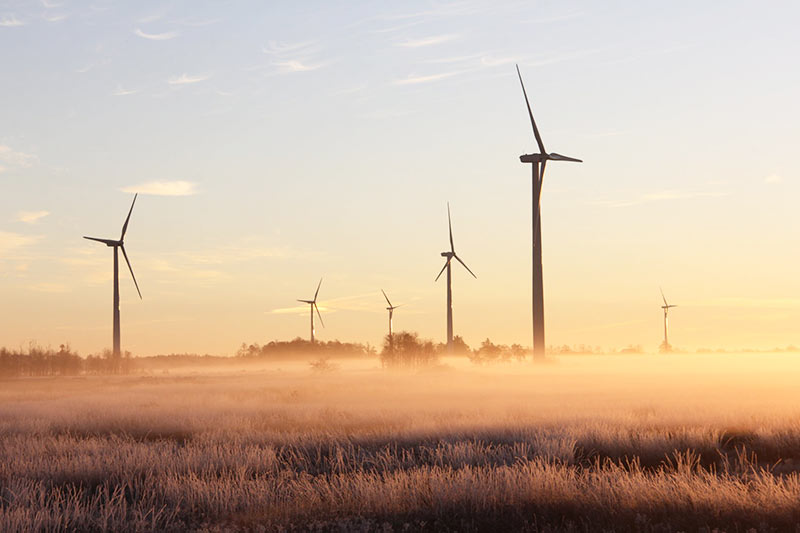Do you want to reduce your ecological footprint and are wondering what you can do to do so? Then you've come to the right place! Eating, traveling, heating or shopping - the daily behavior of each and every person on this planet consumes natural resources and pollutes the environment. For one more, for the other less.
In order to preserve the planet for ourselves and future generations and to make the environmental impact of personal actions measurable and comparable, the ecological footprint an important sustainability indicator has been developed. It determines the biologically productive area on our planet (with limited ecological capacity) that is necessary to maintain our own lifestyle in the long term.1
In this article, I would like to introduce you to valuable tips on what you can do right now to improve your personal ecological footprint. Let's go!
10 tips: How can I reduce my ecological footprint?
Before we move on to the tips, you should first check your current, Determine ecological footprint with this calculator. Please be absolutely honest in your answersin order not to falsify the test result.
Your result will be displayed in "Global hectare" (short: "gha") is given. The value makes the footprint of people at different locations in this world with different, biological productivity comparable. You'll also learn, how many planets we would need if all of the world's citizens had your ecological footprint.
When testing, you will quickly notice that especially the areas of Nutrition, housing, mobility and Consumption are decisive for your footprint on our planet.
After you have determined your valueyou can now reduce your ecological footprint by implementing the following tips.
Tip: Have you already heard about Earth Overload Day heard? It is the day of the year on which we humans have consumed more renewable resources than the earth can reproduce in an entire year. In Germany, the day was in 2024 as early as May 2 two days earlier than last year. That's all the more motivating!
1. reduce your consumption of animal products

The "animal detour" is extremely resource-intensive. Animal feed, water, energy, animal suffering... all this is necessary to end up consuming meat, eggs, fish and cow's milk. Even the Deforestation of the rainforests is largely due to the cultivation of animal feed and the production of pasture land.
Who Environmental sins in everyday life If you want to avoid this, you should eliminate animal foods from your diet, vegan life and eat a plant-based diet.
The book Vegan & Easy by Bianca Zapatka* and the online course "Going vegan made easy" by isshappy* can help you significantly with the changeover.
The less animal products you consume, the smaller your environmental footprint. There are ecological as well as health and ethical reasons for this.
Continuing Contributions:
- Why live vegan? The most important reasons
- Stop factory farming - What everyone can do
- Vegan for people - Why veganism also promotes human rights
You already eat vegan? Then you can help other people do the same, Prejudices against the vegan lifestyle file.
2. prefer regional & seasonal foods
If you make a conscious decision when you go grocery shopping Regionality and seasonality you support the economy in your area. At the same time, your purchases become increasingly climate-friendly, as no long transport routes, energy-consuming cold chains or heated greenhouses necessary are.
Your virtual water consumption (indirect water consumption, e.g. for watering your food) is also significantly lower as a result. Just pay attention to regional seals and use this seasonal calendar*so that we always have an overview of what food is growing locally.
Continuing Contributions:
3. make sure your food is of organic quality
Organic certified food is generally more environmentally friendly than products from conventional production. Especially because no or less pesticides used which are a major cause of the Species extinction are.
"Organic" may be a bit more pricey in some circumstances, but it also makes up for it with healthier and more sustainable. If you want to reduce your ecological footprint, you should definitely follow the reliable Organic Seals orient
Keep in mind, however, that organic meat is still meat and is also produced in a very resource-intensive way. A Organic product is therefore not automatically environmentally friendly - but it is generally more environmentally friendly than its conventionally produced counterpart.
Continuing Contributions:
- Buy organic food at a low price - this is how it works
- Organic farming - what is it actually?
- Sustainable pest control - This is how it works naturally
Good to know: Something also needs to change in terms of economic policy. At the moment, the healthier and ecologically better option in the supermarket is often the most expensive and less available. However, it should be the cheaper and more widely available option in order to Protect the environment automatically in everyday life.
4. avoid food waste
The global food waste Causes about 8 percent of total man-made greenhouse gas emissions2 and thus contributes significantly to the Climate Change at.
This is a value that does not need to be created. Especially in our western Abundance Society it is far too easy for us to throw away food because most of the Always (and at any time of the year) available are.
Growing, producing, processing, transporting and storing food are extremely resource-intensive and costly. For a better ecological footprint, it is essential, to value this effort as if you had done it yourself.
The following, for example, will help you keep fresh these washable oilcloths* and these lunchboxes*. Last but not least, you also preserve the Utilization of leftovers and grocery shopping with a traditional shopping list, many foods are saved from the garbage can. 🙂
Continuing Contributions:
5. use and heat only the living space you really need
Heating your home not only costs a lot of money - excessive energy consumption and the use of limited raw materials such as oil and gas also harm the environment. A smaller living space heating would be cheaper and more environmentally friendly.
So pay attention to it the next time you move, that the apartment of your choice is not bigger than it needs to be. Of course, this also applies to the construction of houses. It is also advisable to rely on modern technologies such as a Geothermal heating to switch when possible.
What's more, you don't always have to turn the heating up "full blast". Sometimes just putting on a sweater is enough! Always try everything you can to keep the to keep spent thermal energy in the house during the cold season. In the hot summer months, it is also important to darken the windows to avoid the use of energy-intensive air conditioning.
Continuing Contributions:
6. switch to a green power provider and save energy

If you want to reduce your ecological footprint, you should definitely Switch to green electricity. Whether coal or solar power - the smartphone may charge just as quickly. The main difference between electricity from fossil fuels and regenerative energy sources However, it is in its consequences for the planet.
A Switch to a green and independent green power supplier*. lasts only five minutes and can easily save 1.9 tons of CO2 per year for a three- to four-person household.3 There are few tips that are easier to implement to optimize your own ecological footprint.
Also you should in the household consciously Save electricity. For example, by purchasing energy-efficient household appliances, switching off your PC, TV and unnecessary artificial light sources completely - and by cooking with a lid or air-drying your laundry.
Continuing Contributions:
7. also reduce your direct water consumption
About 120 liters of water is consumed by every German per day directly from your own tap - excluding virtual water consumption for food production. (I have already mentioned this above)
How much water (especially hot water) you use for Body care, the Toilet flush, the Cooking or the Watering the garden is a decisive factor for your ecological footprint.
For example, turn off the water when soaping upjust use the small button for small business on the toilet - and collect rainwater to water your plants in the garden.
Continuing Contributions:
- Reduce water consumption - It's that easy
- Water scarcity - definition, causes, consequences and solutions
8. prefer train, bike & walk
About 4.9 percent of global warming can be attributed to CO2 emissions from air traffic.4 So it's no wonder that flying to the other side of the world - and of course the many Short-haul flights - have an extremely negative impact on your environmental and carbon footprint.
Also Car trips do not cut a good figure. If you have the option, you should therefore use public transport, the train, the bicycle (Here are some great models*) and ideally the Walk on foot prefer. The more you move yourself, the healthier and more environmentally friendly you will generally be on the road.
Of course, flights and car trips can't always be avoided. I also have a few tips for you: If you're flying at least compensate your greenhouse gas emissions. Experience preferred Destinations in Germany and Europe, exchange diesel or gasoline engine for a Electric car and form Carpools with other people to reduce the ecological footprint of you and your colleagues at the same time.
Continuing Contributions:
- Driving sustainably - Here's how
- Is it possible to fly environmentally friendly?
- Good reasons to get on your bike more often
9. optimize your consumption behavior to what is necessary
How often do you buy a new smartphone or new shoes? And do you ever buy something second-hand? Think and live minimalist in any caseto reduce your environmental footprint.
Don't buy every new thing and don't chase after every new trend. rather appreciate the things you have. And reduce your possessions as far as possible to the items that you really - I mean REALLY (!!) - need.
Use instead of own (Sharing) is a good alternative so that you don't have to do without anything. Swapping, sharing, borrowing, repairing and making things yourself are other important basic rules for a more ecological consumer behavior.
And if you buy something new, then try Online stores with a sustainable philosophy to do. For example in the Avocadostore*.
Continuing Contributions:
- Why you save money through sustainability
- Store sustainably online - here's how
- Durable fashion - making clothes last longer
- Slow Fashion - How to treat clothes sustainably
Notice: Also remember that pets worsen your environmental footprint. The more pet food and water they need, the less sustainable your own daily life will be. For example, how you can reduce Reduce your dog's carbon footprintI explain in the linked blog article.
10. reduce the amount of waste you produce

Plastic waste in the environment is one of the biggest environmental problems of our time. The waste we produce (whether Plastic, waste paper or electronic waste) naturally also results in a worse ecological footprint.
So if you want to improve it, you should do so in the spirit of the Zero Waste Lifestyle make as little waste as possible. Not only because the waste in the environment but also because it elaborately recycled or must be incinerated.
For example, get this reusable Coffee2Go cup* and prefer such glass straws*to minimize your disposable waste. Borrow magazines instead or read them digitally.
There are endless ways to avoid waste. It is best to evaluate your garbage can after a week to see your savings potential at a glance.
Continuing Contributions:
- Zero Waste Tips - Avoid waste in a targeted manner
- Living plastic-free - The most important tips
- Zero Waste for Beginners
It's really easy to reduce your carbon footprint!
Now you have learned many useful tips for a more environmentally friendly everyday life. Just put them into practice bit by bit and then simply do the test again.
I can guarantee you - also from my own experience - that your ecological footprint will improve significantly.
"Nobody made a greater mistake than he who did nothing because he could do only a little."
Edmund Burke (more at Environmental protection quotes)
Please be aware that your gha value does not have to be zero. You don't have to do anything perfectly - Constant improvement will also get you to the goal. Every step in the right direction is better than doing nothing at all. I, too, have plenty of room for improvement, even though I deal with environmental protection and sustainability every day.
And another thing: it's just great that you're doing everything you can to keep your Making life more sustainable! That is half the battle for an ever more environmentally friendly society. The other half is your "political handprint" dar. Use this time at school, work or in your community to make even more people aware of how easily they can protect our planet every day.
Do you have any questions, suggestions or further tips and ideas for a better ecological footprint? Then feel free to write me a comment.
Stay sustainable,

PS: You can get more tips in the Environmental protection blog. Learn there for example, what you can do about air pollution. Good luck!
References:
- Wikimedia Foundation Inc: Ecological Footprint, available at https://de.wikipedia.org/wiki/Ökologischer_Fußabdruck. [07.02.2025]. ↩︎
- European Parliament: Food waste in the EU: Millions of tons of food end up in the bin (infographic, as of 15.05.2017), available at https://www.europarl.europa.eu/news/de/headlines/society/20170505STO73528/lebensmittelverschwendung-in-der-eu-infografik. [07.02.2025]. ↩︎
- Kathrin Fromm: 5 tips on how to reduce your ecological footprint (as at: 17.01.2018), available at https://www.nationalgeographic.de/umwelt/2018/01/5-tipps-wie-sich-der-oekologische-fussabdruck-verkleinern-laesst. [07.02.2025]. ↩︎
- Bund für Umwelt und Naturschutz Deutschland e. V. (BUND): Die wahren Kosten des Fliegens: Klimakiller. https://www.bund.net/themen/mobilitaet/infrastruktur/luftverkehr. [07.02.2025]. ↩︎








